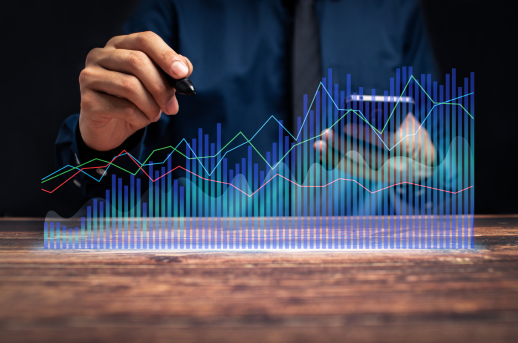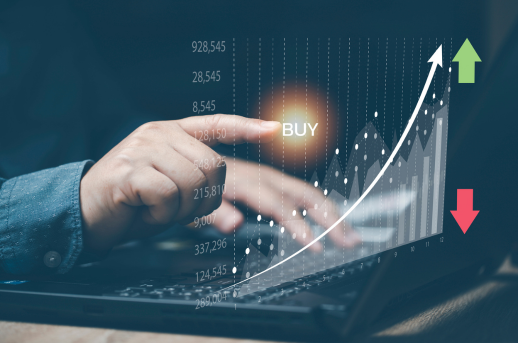
-
Apexlink
Real Estate
-
DLS
General Insurance
-
DMV
Government
-
Entiger
Fintech
-
GIS Mapping
Gas & Petroleum
-
HMS
Employee Benefit
-
HAWA
Government
-
Harley
Community
-
IHG
Hotel & Tourism
-
Sparkseeker
Humane Tech
-
Track Ninja
Sports
-
Response Vision
Disaster Management
- Artificial Intelligence
- Application Services
- Automation Services
- Cyber Security
- Chatbot Experts
- Data Analysis
- Data Warehouse Services
- Machine Learning
- Digital Commerce Services
- Digital Transformation
- Infrastructure Service
- IT Support
- IT Consulting
- IT Outsourcing
- IOS Development
- Android Development
-
Cross Platform Development
-
Gaming App Development
How amazing would it be if we lived in a world where everyone could make complex stock market decisions with near-perfect precision every single time? Well, we have news for you! This world now exists, thanks to the innumerable extraordinary capabilities of AI stock trading.

As per a recent report, AI-driven stock trading will likely dominate the financial market in the coming years, with more than $1 trillion managed solely by AI algorithms. Let’s take a deep dive into how AI in stock trading is bringing a 360-degree change in the financial landscape.
Understanding the Role of AI in Stock Trading
AI trading systems are powered by machine learning algorithms and big data analytics, both of which help improve the trading process for the modern trader. This powerful amalgamation of technology is capable enough to analyze millions of data points, make data-driven predictions, and execute traders faster than any human could.
AI in stock trading is significantly influencing how both amateur and professional investors approach the market by utilizing predictive models that learn and adapt continuously.

The Challenges with Traditional Stock Trading Methods
Before going gaga over the benefits of AI-driven stock trading, it makes sense to look at the limitations of traditional stock trading methods. Well, stock market investing has been a game of strategy and timing since the very beginning. Seasoned traders rely on their analytical skills, emotional intelligence, and understanding of market trends to decide whether to buy or sell.
However, it is important to take into consideration that there exist human limitations like bias, inability to process vast amounts of data, and slow reaction times can potentially lead to costly errors. AI stock trading solves this by revolutionizing the financial domain with unparalleled efficiency and accuracy.
How AI for Stock Trading Addresses These Challenges
AI in stock trading addresses the challenges posed by traditional trading methods in the following ways:
Speed & Efficiency
Using AI for trading ensures speed and efficiency by analyzing market trends and executing trades within milliseconds. This helps ensure that you or your users never miss an opportunity!
Data Analysis
AI in stock trading analyzes vast amounts of financial data from different kinds of sources like historical prices, social sentiment, and even financial news to predict stock movements with precision.
Emotion-free Trading
Using AI to trade stocks can significantly eliminate emotional biases, which can often derail even the most well-thought-out strategies.
| Aspect | Traditional Stock Trading | AI Stock Trading |
|---|---|---|
| Decision Making | Human-based analysis and intuition | Data-driven algorithms and machine learning |
| Speed of Execution | Relatively slower, manual order placement | Extremely fast, automated, and real-time |
| Data Analysis | Limited to human capacity and time | Processes vast amounts of data instantly |
| Emotion Influence | Prone to emotional biases | Emotion-free, objective trading decisions |
| Market Monitoring | Monitors limited assets at a time | Constantly monitors multiple assets simultaneously |
| Adaptability | Slower to adapt to market changes | Quickly adapts using self-learning models |
| Cost | Higher transaction costs due to manual processes | Potentially lower costs due to automation |
| Risk Management | Relies on human judgment and experience | Uses predictive models and automated strategies |
Real World Applications of Stock Trading AI
Leading fintech software development companies around the world are already utilizing artificial intelligence solutions for stock trading to create powerful solutions and a competitive edge for their clientele. Here’s an example: an AI trading system can scan thousands of news articles in real time using NLP to extract sentiment data and make trading decisions accordingly.

In fact, generative AI development is also being employed by top market players to develop even more advanced models that can adapt to unpredictable market conditions seamlessly. These generative artificial intelligence models can simulate market conditions to create hypothetical scenarios and test the effectiveness of different AI and stock trading strategies. This allows traders and firms to fine-tune their approaches without incurring any financial risk.
Seasia Infotech, as an experienced fintech software development company, can harness this potential to create bespoke platforms for AI trading of stocks.
For more insights, check out our comprehensive guide on Investment App Development.
Benefits of AI in Stock Trading
Now, let’s take a closer look at all the benefits AI stock trading offers.
Improved Accuracy
AI trading techniques have a higher accuracy rate than traditional methods due to their ability to analyze and learn from massive data sets.
Risk Reduction
AI stock trading models come with risk management algorithms that adjust portfolios based on real-time data, minimizing potential losses.
Cost Efficiency
Automating trades and data analysis reduces the need for large teams of analysts to cut down operational costs significantly.
Predictive Analysis
Use AI to trade stocks and experience enhanced predictive accuracy. This provides traders with vital insights into potential market shifts.
But how does AI in stock market work?

How AI Trading Techniques Work
Successful execution of AI stock trading typically involves the following:
Algorithmic Trading
Algorithmic trading, often called algo-trading, involves using pre-programmed instructions or algorithms to execute trades. Based on variables like timing and price, these instructions enable automatic trades that are faster than manual execution. This technique is generally used in high-frequency trading settings where algorithms place large volumes of trades within milliseconds.
Machine Learning Models
Machine learning models use historical data to identify patterns and make predictions. These models learn from past performance to refine their accuracy and improve as the volume of data increases. ML models in stock trading are often used to predict stock price trends, identify optimal entry and exit points, and analyze market volatility.
Deep Learning Models
Deep learning is a subset of machine learning that involves using neural networks with multiple layers to analyze complex patterns in large data sets. Deep learning models are particularly effective in processing unstructured data, like news articles and social media sentiment. For example, a neural network model can easily analyze social media posts and news headlines to detect market sentiment and make stock trading decisions.
Sentiment Analysis
Sentiment analysis examines social media, news articles, and other sources to gauge market sentiment. The AI then uses this sentiment to predict stock movements. This technique is often used to anticipate market trends based on public opinion, geopolitical events, or breaking news.
Reinforcement Learning
Reinforcement learning is an AI technique where the model learns by trial and error, receiving rewards or penalties based on its actions. Over time, the model optimizes its strategy to maximize rewards.
Natural Language Processing
NLP allows AI systems to understand and interpret human language. In trading, NLP is used to process vast amounts of textual data such as earnings reports, financial statements, and news releases. A common example of use of AI in stock trading can be an NLP algorithm that processes a company's quarterly earnings call transcript to identify positive or negative language that might affect stock prices.
Predictive Analytics
Predictive analytics uses historical data, machine learning, and statistical techniques to forecast future outcomes. It’s frequently used to predict stock price trends and identify potential market shifts.
Generative Adversarial Networks
GANs are a class of machine learning frameworks where two neural networks compete against each other to improve data generation. In trading, GANs can be used to create synthetic data for backtesting strategies. It is often used for creating robust AI stock trading models by simulating market conditions without actual financial risk.
Statistical Arbitrage Models
These models use statistical methods to exploit price differentials across related securities. AI can enhance arbitrage models by identifying and executing on these opportunities faster and more accurately. Imagine an AI system that identifies small price differences between two correlated stocks and executes trades to profit from this arbitrage opportunity.
Companies specializing in AI software development services play an integral role in crafting sophisticated AI stock trading platforms. They combine financial market expertise with advanced technology to create systems capable of transforming raw data into actionable insights.
As your trusted fintech software development company, Seasia Infotech offers tailored solutions that incorporate AI-driven strategies and platforms that grow with your investment needs while ensuring data privacy and compliance with various financial regulations.

To Sum It Up
AI and stock trading are a match made in financial heaven, offering an edge to those who invest in these technologies. Whether you are a seasoned investor or new to the game, the future of AI in stock trading is bright, promising higher returns and fewer risks.
Explore Seasia Infotech’s cutting-edge AI software development services or schedule a demo today. Let’s revolutionize trading experiences for everyone with the power of artificial intelligence!
Frequently Asked Questions
Can you use AI to trade stocks?
Yes. There are many AI stock trading systems that leverage technologies like machine learning and big data analytics to automate stock trading strategies. These platforms are much preferred as they analyze data and execute trades much faster than human traders.
How to use AI for stock trading?
Investing in AI-driven trading platforms and developing custom solutions are two effective ways of using AI for stock trading. You can consider partnering with our AI software development services companies for help with designing platforms tailored to your specific trading goals and risk profiles.
What is the best AI stock trading software?
The best AI stock trading software will solely depend on your needs, but popular options include platforms offering real-time data analysis, risk management, and sentiment analysis features.







 Artificial Intelligence
Artificial Intelligence
 Blockchain
Blockchain Cloud Computing
Cloud Computing Infrastructure
Services
Infrastructure
Services Metaverse
Metaverse QA
Automation
QA
Automation UI/UX
UI/UX








